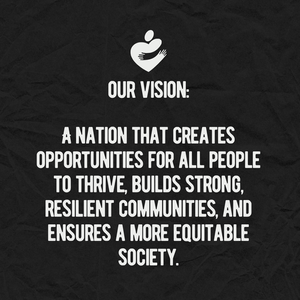Taking Action Against Structural Racism
The history of the Community Action movement is rooted in the belief that the experience of poverty is of fundamental concern to all Americans, that we are all directly and indirectly impacted by the existence of poverty, and only when our most marginalized community members thrive can we all thrive. The persistent existence of poverty is morally and ethically wrong, and for 44 years the Community Action Partnership of North Dakota has worked tirelessly within our communities to support struggling families work to achieve economic independence.

We know that despite our efforts, Black, brown, and Indigenous people in North Dakota make up a disproportionate amount of those experiencing low levels of social and economic well-being. This means that across the state our Black, brown, and Indigenous community members are more likely to live in poverty, experience economic insecurity, and that this reality impacts the well-being of us all.
With the killing of George Floyd a few weeks ago while in police custody, racial inequities and the resulting social and economic injustices can no longer be decentralized in our efforts to eradicate poverty. We must make the connection between systemic racism and persistent poverty and recognize that as long as one of these systems remains embedded in America, we will not be able to fully eradicate either experience.
Racism, whether individual, institutional, or systemic, is of fundamental concern to all Americans. We are all directly and indirectly impacted by the existence of racism. The persistent existence of racism is morally and ethically wrong. Only when our most marginalized community members are free from racism can we all thrive.
Today, we are especially reminded of the historical implications of our words versus our actions. The signing of the Emancipation Proclamation formally ordered that enslaved people were to be freed. However, it was not until two-and-a-half years later, June 19th, 1865, that the news finally reached Galveston, Texas and the remaining enslaved people were freed. This disparate experience of freedom and justice continues today through enduring racial inequities.
We at SENDCAA know that inequity and injustice will continue until our actions match our words. We are committed to establishing more meaningful working relationships with those representing and advocating on behalf of our Black, brown, and Indigenous community members to further embed racial justice in our work. Within our own organization, we commit to training staff, board members and volunteers on the pervasive issues of racial discrimination, like implicit bias and white privilege, which directly impacts our day-to-day work of eliminating poverty.
There is no peace without justice and accountability. It is not enough to condemn racism. We must be actively anti-racist in all our pursuits. With the support of North Dakotan’s moved by the tragedy of George Floyd’s unnecessary death, the National Community Action Partnership, and CAP agencies across the country, we will continue helping people help themselves and each other.
Resources to Understand, Communicate, Strategize and Take Action
Understanding the structural racism in America's public safety institutions and how we can effectively advocate for fair and equitable policies:
-
George Floyd, Tony McDade, Sean Reed, Breonna Taylor: The Killing Must StopSouthern Poverty Law Center
-
Legal Barriers to Challenging Excessive Force by PoliceEqual Justice Initiative
-
New Era of Public Safety: A Guide to Fair, Safe, and Effective Community PolicingThe Leadership Conference on Civil and Human Rights
-
New Era of Public Safety: An Advocacy Toolkit for Fair, Safe, and Effective Community PolicingThe Leadership Conference on Civil and Human Rights
Communicating about race, racism, and its impacts:
-
RX Racial HealingDr. Gail Christopher
-
Talking About DisparitiesFrameworks Institute
-
Talking About RaceSmithsonian National Museum of African American History and Culture
-
Truth, Racial Healing and Transformation Implementation GuidebookW.K. Kellogg Foundation
-
The Kerner Commission: 50 Years LaterFrameworks Institute
Community Action's history and its deep roots in the Civil Rights Movement, particularly the principles of justice and equity:
-
The Great SocietyThe LBJ Presidential Library
Uncovering and addressing biases that feed structural racism:
-
Understanding Implicit BiasThe Kirwan Institute for the Study of Race and Ethnicity
-
We All Have Implicit Bias. So What Can We Do About It?Dushaw Hockett, SPACEs
Partnering with those already active in the field of promoting racial equity:
Understanding how Structural Racism and the othering of people of color has made the COVID-19 pandemic especially deadly and economically devastating for communities of color:
-
A Wider Lens on the Impact of COVID-19W.K. Kellogg Foundation
-
Caring for Mental Health in Communities of Color During COVID-19Robert Wood Johnson Foundation
-
Coronavirus in African Americans and Other People of ColorJohns Hopkins Medicine
-
COVID-19 in Racial and Ethnic Minority GroupsCenters for Disease Control and Prevention
-
Policies to Protect People and CommunitiesThe Urban Institute

